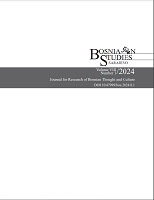The Question of Guilt and Forgiveness in the Bosnian-Herzegovinian Context versus the Obscurity of National-Messianic Narratives and Mythology
The Question of Guilt and Forgiveness in the Bosnian-Herzegovinian Context versus the Obscurity of National-Messianic Narratives and Mythology
Author(s): Abdel Alibegović, Nermina Mujagić, Amer OsmićSubject(s): Social Philosophy, Contemporary Philosophy, Sociology of Culture, Sociology of Politics, Geopolitics, Peace and Conflict Studies, Wars in Jugoslavia
Published by: Bošnjačka zajednica kulture "Preporod"
Keywords: programs of evil; ideology of national messianism; imprisoned mind; radical evil; forgiveness-guilt;
Summary/Abstract: Humankind, as well as society in its totality, faces various forms of evil and ideological delusions that imprison the mind and bring societies, communities and individuals, into a state of obscurity. This phenomenon stems from the inability or incapacity to find meaning in one’s own and others’ existence. The previous attitude to Bosnia and Herzegovina thus far, and everything Bosnian, including genocide and aggression, emphasizes the importance of understanding the alienation of man and his tendency to evil. Programs of evil must be recognized as political-ideological constructs, and their moral and critical demystification is necessary, especially in the context of the Bosnian-Herzegovinian reality/present, but also for its future. The Bosnian identity encompasses ideas of goodness, respect, and syncretism. Anti-Bosnian programs of evil, if not adequately interpreted and assessed, can threaten the Bosnia and Herzegovina’s long-standing autonomy. It is crucial to analyze and reconstruct the doctrine of national messianism within a broader spiritual-historical context, which includes the transformation of Christian-theological values into secularized political theory. The issue of forgiveness and confronting past injustices is a moral challenge. We must strive to consider the moral importance of facing the truth, regardless of the cost, and ensure that the future is not placed above the past in a way that would diminish the importance of true justice. Theoretically, it is essential to emphasize the rights of the weakest, the arrogance of the powerful, collective evil, and true justice.
Journal: Bosnian Studies: Journal for research of Bosnian thought and culture
- Issue Year: 8/2024
- Issue No: 1
- Page Range: 42-56
- Page Count: 15
- Language: English

